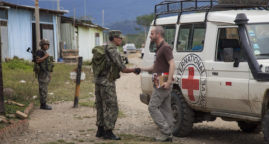How to better fight human trafficking: The Order of Malta organizes conference with international experts to forge new synergies
Article published on Sovereign Order of Malta website on 10/09/2019
Over the past two years the Sovereign Order of Malta has scaled up its action in the fight against human trafficking. Yesterday, in Paris, it organized the conference “How to better fight sexual trafficking of women in West Africa and support their rehabilitation”, bringing together dozens of experts, including diplomats, academics, policy makers, representative of European and Nigerian institutions, Catholic organizations, sister’s congregations, and psychosocial counsellors. Aim of the discussion, articulated in 3 thematic round tables – preventing departures and identifying trafficking, protecting victims in France and Europe, and rehabilitation of victims – was to strengthen synergies and partnerships between the different actors engaged on the ground and at the international community level, in order to boost the fight against this terrible scourge that has sadly reached unprecedented numbers.
The conference focused primarily on Nigeria, where the ever-growing demography and the dire living and economic conditions, are bolstering the human trafficking industry which has become a tactic of war. “The abduction of women and girls by Boko Haram represents a deliberate strategy generating revenue”, the Grand Chancellor of the Order of Malta Albrecht Boeselager stressed in his opening remarks. The Grand Chancellor mentioned the work of the Order of Malta in Nigeria where, with the support of one of its Ambassadors at large tasked with tackling human trafficking, a quality shelter home was inaugurated in Lagos in early 2019, offering care, protection and rehabilitation to women who have been victims of trafficking and have returned to Nigeria.
Sister Patricia Ebegbulem, who runs the Bakhita house, illustrated the “welcoming programmes” offered to the women assisted, starting from their very arrival at the airport and continuing with the integration and rehabilitation process, based on a “transformational” approach through which victims gradually regain trust and self-confidence.
The severe – sometimes irreversible – traumas experienced by the victims was acknowledged by all the participants, and the Grand Chancellor stressed the extent to which these young women become submissive : “Unimaginable painful rituals are inflicted inducing the victim to feel obliged to comply and obey to her traffickers and to believe that breaking the voodoo oath sealed in front of a shaman will result in awful consequences for her and her family”.
The psychological consequences of being sexually exploited – asides the many dramatic physical outcomes – were unravelled by the “hands-on” practitioners participating in the conference, who with their foundations and rehabilitation centres across Nigeria and France, deal every day with trafficked women, many of which are minors.
The meeting centred around the return programmes which according to panellists should be improved and refined, and on the compelling need to improve the training of professionals in the field of law enforcement. Likewise, the implementation of stronger cross-national strategies to better identify and protect victims of sexual trafficking, 75% of which all come from South-West Africa, and a better funding system to encompass the many local organizations – many of which run by nuns – was also raised during the meeting.
In his closing speech, the Grand Hospitaller, Dominique de La Rochefoucauld-Montbel, stressed the great commitment demonstrated by Ordre de Malte France, coordinator of the event, and of the whole of the Order of Malta which, with its large diplomatic network, is fully engaged in raising awareness in the international community and is ready to support new partnerships and synergies.
Related Articles
UK technocrat appointed UN humanitarian chief – reports
05/10/2017. Lowcock takes over as famine threatens four countries and humanitarian principles are trampled in Syria.
The “New Way of Working”: Bridging aid’s funding divide
06/09/2017. The so-called New Way of Working (NWOW) has, according to its champions, the potential to radically improve how emergency relief programmes are designed and delivered.
Challenges & dilemmas in frontline negotiations: Interview with Claude Bruderlein
01/04/2018. Read Claude Bruderlein about current challenges in humanitarian negotiations in conflicts around the world.






